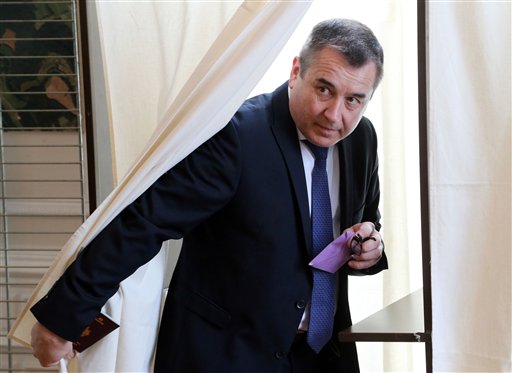
All eyes were on the vote in France’s eastern Doubs region which served as an electoral test after the Jan. 7-9 terror attacks in France that killed 17 victims and the three radical Islamic gunmen.
Winner Frederic Barbier said his victory over National Front candidate Sophie Montel was helped in part by French leaders’ “perfect handling (after) the acts of war against the citizens of our country.”
But he, above all, castigated his opponent’s National Front party, “which distills intolerance, hate, racism, anti-Semitism … (and) is becoming a real threat to our country.”
Such harsh condemnation has become rare in France even among opposition politicians as the National Front raises its profile.
Barbier won with 51.4 percent of the vote, compared to Montel’s nearly 48.6 percent.
With such a narrow victory, Montel claimed her National Front was the election’s “big winner.”
The National Front candidate took a slight lead in last week’s first-round vote, and was hoping to capitalize on a perceived climate of fear since the attacks. Montel, a well-known local politician, had warned against the “Islamic peril” during her campaign, while Barbier looked for the unity vote.
National Front leader Marine Le Pen denounces “massive immigration” and links it to the rise of Islamic extremists.
The trauma wrought by three radical Muslims boosted the sagging profile of President Francois Hollande. Since then, he has worked to limit a backlash against France’s 5 million-strong Muslim population and ensure that youth living on society’s margins become active members of French society.
The vote was to fill the parliamentary seat of long-time Socialist Party figure Pierre Moscovici who resigned to become a European commissioner. But it had a national significance, and Prime Minister Manuel Valls visited the region to campaign on Barbier’s behalf, as did Interior Minister Bernard Cazeneuve. Both men were key players during the attacks and are at the center of handling the aftermath, from cracking down on extremist networks to limiting an anti-Muslim backlash.
Both Barbier and Montel were vying for the votes of the once-powerful conservative UMP party of former President Nicolas Sarkozy — whose candidate was eliminated in first-round voting. That loss laid bare new divisions in the party, which failed to agree on whether or not to advise Doubs voters to join the rival Socialist candidate — and lock out the far right.
Barbier used his victory speech to warn the nation against the National Front, saying “year after year, election after election it progresses … and is becoming a peril for our democracy.”
He said his win, while narrow, shows the left can rebound despite a string of defeats since Hollande took office in 2012 — but only if it regains the confidence of citizens.
Associated Press

Leave a Reply
You must be logged in to post a comment.